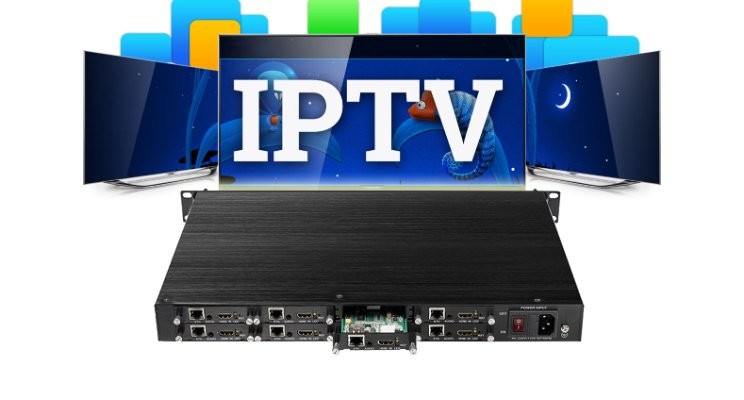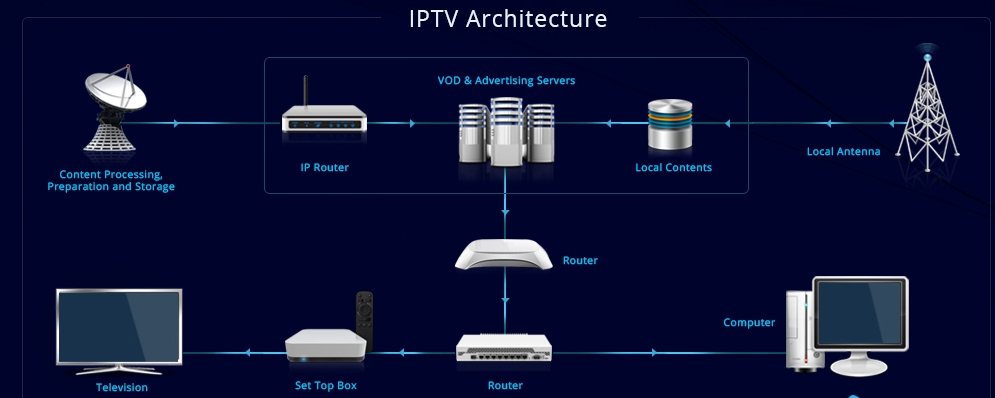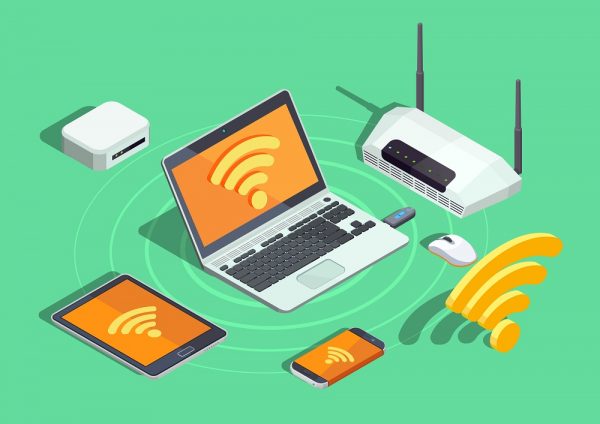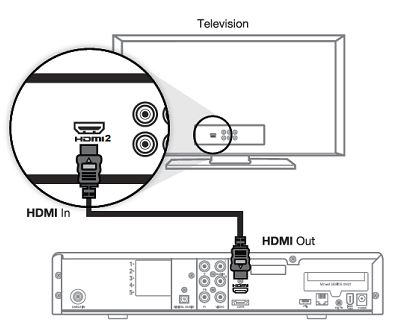What is IPTV encoder everything you need to know about will be described in this article. You may now get the solutions and answers on FMUSER.ORG. There’s nothing more frustrating than attempting to watch your favorite movie or television program and having it continuously buffer and freeze. Even worse is when you are unsure of how to improve the situation. There are several possible causes of freezing and buffering issues. Check out the section below to see if this is helpful. Since every person’s internet and configuration are unique, you need figure out what works best for you so that adjustments can be made to properly create IPTV that doesn’t freeze.
What is IPTV? How To Solve IPTV Buffering Or Freezing?
In this article, you can know about What is IPTV encoder here are the details below;
1) What is IPTV?
Users can watch television shows online via IPTV, or internet protocol television, as an alternative to using fiber-optic cables, satellite dishes, or antennas. Put differently, IPTV transmits video content via direct internet streaming.
As the images demonstrated, churches and schools can use the IPTV system. For additional details, visit http://fmuser.org.
While IPTV content delivery is not the same as that of OTT services like Netflix or online video platforms like YouTube, it does have many of the same features. With IPTV, for example, subscribers can watch live broadcasts and access video on demand (VOD) content. This allows viewers to continue to enjoy live events and programming just as they would on traditional TV, but with the added freedom of watching their favorite shows whenever they want.
Because of its adaptability, IPTV surpasses traditional TV and is seen as the television of the future.
2) What is IPTV Buffering?
While the term “buffering” can apply to many different things depending on the technology in question. When we discuss buffering in the IPTV field, we exclusively discuss buffering in IPTV streaming. Preloading data into a buffer—a designated section of memory—is known as IPTV buffering. When it comes to streaming audio or video, buffering is the process by which the program downloads a certain quantity of data before starting to play the audio or video. While the next section of the file downloads in the background, you can view the data that is stored in the buffer. This preloading procedure guarantees uninterrupted playback, at least in theory and most of the time in practice.
Progress is frequently shown as a percentage in buffering messages. 75% indicates that 75% of the buffer memory has been used. Upon reaching 100%, the sound or visual media begins to play.
3) Why The IPTV Buffering or Freezing?
Freezing and buffering are two of the main problems that many users of private IPTV services encounter. In order to prevent IPTV from buffering or freezing, we must identify the cause of these issues. We’ll talk about the six primary causes of buffering and freezing IPTV services.
(1) Suitably Fast Internet
The main cause of freezing and buffering is inadequate internet speed.
A minimum of 7–10 MBPS download and 1-3 MBPS upload speed is required for your internet. However, many clients still do not receive a sufficient internet package with the right speeds to use their IPTV service to the fullest, even after receiving professional advice.
(2) Ethernet Link
When connecting straight to the modem, we advise utilizing a minimum of 25Mbps. You should stop using this if there are no other devices connected. We suggest 150Mbps if you’re connecting over WiFi, depending on how your home is set up. Depending on where your modem is in relation to your IPTV box, this will change.
Goods to enhance your wireless IPTV experience include: WI-FI adapters (300 Mbps or more), and power-over Ethernet (1000 Mbps preferable).
(3) Constrained streaming source bandwidth
The insufficient bandwidth is caused by two factors. a) Too much traffic pipes provided by the ISP. b) There’s too much trash in the road. The TV won’t function if you use download managers or torrents in addition to IPTV. Torrent will use up all of your network’s resources, leaving nothing for IPTV. The answer is fairly straightforward: avoid downloading movies when utilizing IPTV.
(4) The connection speeds of the Internet Service Provider (ISP).
(5) The inability of wired routers to transport streaming video
The majority of routers manufactured more than two years ago were not intended to transfer streaming video. The router will cause the IPTV buffer if it has trouble deciphering the protocols and transmitting the data. While D-Link or Wireless routers are unable to send streaming video effectively, are misconfigured, or are not secured, other routers have been proven to be more dependable and to operate better with less issues.
(6) Server Quality: Both Cost and Quality Count. Many consumers choose services that cost between $8 and $12 because they are seduced by the incredibly low prices. Experience has shown that while these solutions might function for a short while, long-term results shouldn’t be expected for such costs. Due to the low cost, a lot of individuals sign up in bulk, which eventually causes traffic to build up and causes the system to slow down, freeze, and buffer. These low-cost servers frequently don’t have customer support either. Your best bet is to get a server that costs between $15 and $25, with $20 being the sweet spot, for higher server quality and speeds. These top-tier/premium servers often offer pretty extensive customer care and are kept in good working order.
4) How to Solve The IPTV Buffering or freezing?
In an effort to test for improved performance, the administration team occasionally switches channels and tests the server(s). When IPTV freezes or buffers, the providers take three things into account.
(1) Internet speed
Lower internet speed will result in slower channel loads and longer buffer times. We thus immediately check for connectivity speed when clients report issues. If it’s low, we advise our clients to upgrade to a more expensive internet package. We also verify that they are utilizing the appropriate middleware.
You can advise customers to purchase a router that can keep up with demand if their home is crammed with the newest, most bandwidth-draining gadgets. To prevent the dreaded freezing and buffering, these demanding wireless activities—which range from downloading music and streaming movies to playing the newest online games and watching YouTube videos—require a fast, robust wifi connection.
(2) Selecting Middleware
The choice of middleware is next. The program that serves as a conduit between the operating system and the IPTV apps that are installed on it is known as middleware. Selecting the incorrect middleware can lead to some IPTV channel freezing issues. Thus, our Committed Engineers advise making use of an IPTV box. It features an integrated Wi-Fi (or antennae attachment) that can be used in conjunction with an Ethernet power adapter or Wi-Fi booster because of its rapid output at 5 Mbps. The IPTV box’s Wi-Fi internet connection may be one of the causes of channel freezing. We advise our customers to utilize an Ethernet Over Power adaptor to get around this.
(3) Server Quality
The quality of the server is another important consideration in the IPTV market. The quality of IPTV service is significantly influenced by the server’s performance.
(1) Obtain Suggested Equipment
The way your service is promoted will depend on the equipment you purchase. Purchasing the box that the service provider suggests is advised. They typically already know which settings work best for their machine. But use caution, start your investigation, and make sure you have all the questions you can think of. Rather of utilizing Android boxes with emulators, we advise using dedicated IPTV boxes. With no programming needed, specialized IPTV boxes are designed for live streaming and other IPTV capabilities and functions. Programming is necessary for Android boxes with emulators, which can be challenging.
(2) Ethernet Power Line Adapter/ *Ethernet Over Power
If you are able to pay the $70–$100 price tag, this is likely among the greatest options. Many users connect their IPTV box to the internet via Wi-Fi, which causes stalling and buffering. This is made easier using a *Ethernet Over Power adapter. With this gadget, you may achieve nearly 100% modem speed by hardwiring your IPTV box straight to a source stream. No specific technological setup is needed.
(3) Make sure the website you’re using and your internet speed are compatible.
A reliable internet connection necessary for the streaming multimedia. The following suggestions are provided by Fmuser org. for streaming their content:
- A minimum of 0.5 megabits per second is needed.
- 3.0 megabits per second is the recommended speed for SD grade content; 1.5 megabits per second is the recommended speed for broadband connections.
- 5.0 megabits per second is the recommended speed for HD quality content; 25 megabits per second is the ideal speed for Ultra HD quality content.
This also serves as a basic guideline for content streaming from other sources. Please be aware that a bottleneck will form if numerous users attempt to the access the same streaming feed at once. Whatever you do, this will result in higher buffering.
(4) Issues with network connectivity
Buffer settings on each receiver let you fine-tune the buffer size to best suit your internet conditions. You should take an internet speed test to check what your results are if your connection speed is equal to or more than 5.0 Mbps/second and you are still having problems. If the speed recorded by the above-mentioned linked testing service is less than anticipated, take into consideration the following remedies:
If you are connecting to the internet wirelessly, you might need to move your device closer to your wireless router. The probability of losing signal integrity increases with distance.
⑯ You might also want to think about switching to a wired connection. Any problems with poor signal integrity brought on by being too far away from your router will be resolved by a wired connection. There will also be a speedier connection. Nevertheless, using this option will restrict your configuration to a single location.
③ Make sure no additional devices are using up your bandwidth by connecting to other devices on your network. Disconnect these if this is the case to avoid any interference with your IPTV.
(5) Give it a three-minute rest.
There are situations where TV channels are working properly but Video on Demand is not, or vice versa. It is always recommended to press play on a video club movie and then pause it for around three minutes to let your internet to download the file. This way, the movie will already have successfully buffered some time when you press play again. Rebooting your IPTV box as well as the entire network might occasionally be helpful as it can clear up any outdated data that has been used for network transfers.
5) What to do if IPTV has no sound
IPTV frequently has issues. And in the event that IPTV is silent, what should we do? You might find the following points useful.
(1) Verify if the sound on your IPTV is muted.
- To make sure it is loud enough to hear, press the VOLUME UP button.
- Using the Shaw Remote or the original remote that came with your TV, press the MUTE button.
- Switch to an alternative channel.
- Verify that the sound bar is turned on and plugged in correctly if you’re using one.
(2) Reset the IPTV box: Resetting your IPTV box may help resolve audio problems.
- Turn the IPTV box off.
- Disconnect the power line from the power bar or wall socket, as well as from the rear of the device.
- Reconnect the power cable to the device and the power source after 30 seconds of waiting.
- Give the IPTV box up to two minutes to reset.
- Turn on your IPTV device and give it another go.
(3) Verify that SAP/MTS is turned on.
AMI-audio is utilized in Secondary Audio Programming (SAP), a service that broadcasts for accessibility or other languages. Also check Live TV Apps Like Mobdro
How to turn off SAP on your IPTV:
- Find the original remote (not the Shaw remote) that came with your television.
- Find the AUDIO option by pressing the MENU button.
- Using your remote, press the SAP, AUDIO, or MTS button.
- Make sure you choose STEREO or MONO rather than SAP or MTS.
The aforementioned instructions might change based on your IPTV. SAP, AUDIO SELECT, B-AUDIO, MTS, or MENU are common labels for the IPTV audio menus. Consult the IPTV handbook or the manufacturer’s support page for assistance.
You can use the Shaw Remote by pressing the MENU or SETTINGS button twice to get a full-screen menu and disable SAP on your Shaw IPTV box.
- Press OK after swiping down the menu until Setup is highlighted.
- Click OK after selecting Audio Setup.
- Verify that Channel default is selected for the Default Audio Track.
- Hit the “Exit” menu.
(4) Adjust the stereo output.
In most cases, if the audio is not functioning on all channels, you can fix it by optimizing the stereo output on your cable box.
- To view a full-screen menu, double-press the MENU or SETTINGS button on your Shaw remote.
- Press OK after swiping down the menu until Setup is highlighted.
- Click OK after selecting Audio Setup.
- Choose Optimize by swiping down, then hit OK.
(5) Disconnect your receiver and sound system.
If you’ve tried the aforementioned solutions and your IPTV box’s audio is still not working properly, there might be a problem with the sound system (or receiver) you’re using:
- Instead of connecting the IPTV box to the sound system (receiver), connect it straight to the rear of the IPTV to avoid the sound system.
- Verify if the IPTV’s audio has been restored.
Frequently Asked Questions On
Q: Does IPYV require Internet?
How is IPTV operated? Although it should go without saying, a router and a broadband internet connection are required in order to purchase an internet TV. IPTV is essentially video that is streamed to a PC or other device via the internet. Other providers may include video-on-demand or catch-up content in addition to YouTube on your TV. Also check IPTV Players for Windows XP
Q: How can I boost my IPTV?
There are five strategies to increase IPTV:
- Give your router a restart.
- Reload the firmware of your router.
- Adjust the Wi-Fi’s position.
- Set device limitations and optimize settings.
- Obtain a Wi-Fi extender.
Q: Is IPTV better than cable?
It’s difficult to decide which is superior. Since your IPTV streams video via the internet, if you have a poor internet connection during peak hours, you can get pixelated video. If your internet plan is inadequate, IPTV might be a better option, but if you have enough bandwidth, cable is still a superior option.












Add Comment